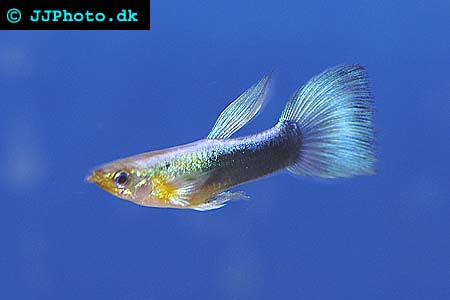Tag Archives: Le Fonds Québécois de la Recherche sur la Nature et les
Fast paced evolution
We often think of evolution as something extremely slow that takes place over the course of thousands or even millions of years. The truth is however that certain adaptations can occur very quickly, sometimes over the course of just a few generations.
Male Guppy. Copyright www.jjphoto.dk
Eight years later, a time period equivalent of less than 30 guppy generations, the guppies living in the low-predation environment had adapted to this environment by producing larger and fewer offspring with each reproductive cycle.
“High-predation females invest more resources into current reproduction because a high rate of mortality,
driven by predators, means these females may not get another chance to reproduce,” explained Gordon, who works in the lab of David Reznick, a professor of biology.
The guppies living below the barrier waterfall where there were a lot of predators did not show any signs of producing fewer or larger offspring.
“Low-predation females, on the other hand, produce larger embryos because the larger babies are more competitive in the resource-limited environments typical of low-predation sites”, Gordon said. “Moreover, low-predation females produce fewer embryos not only because they have larger embryos but also because they invest fewer resources in current reproduction.”
The paper will be published in the July issue of The American Naturalist.
Swanne Gordon’s research team included David Reznick and Michael Bryant of UCR; Michael Kinnison and Dylan Weese of the University of Maine, Orono; Katja Räsänen of the Swiss Federal Institute of Technology, Zurich, and the Swiss Federal Institute of Aquatic Science and Technology, Dübendorf; and Nathan Miller and Andrew Hendry of McGill University, Canada.
Financial support for the study was provided by the National Science Foundation, the Natural
and Engineering Research Council of Canada, the Le Fonds Québécois de la Recherche sur la Nature
et les Technologies, the Swedish Research Council, the Maine Agricultural and Forestry Experiment
Station, and McGill University.
